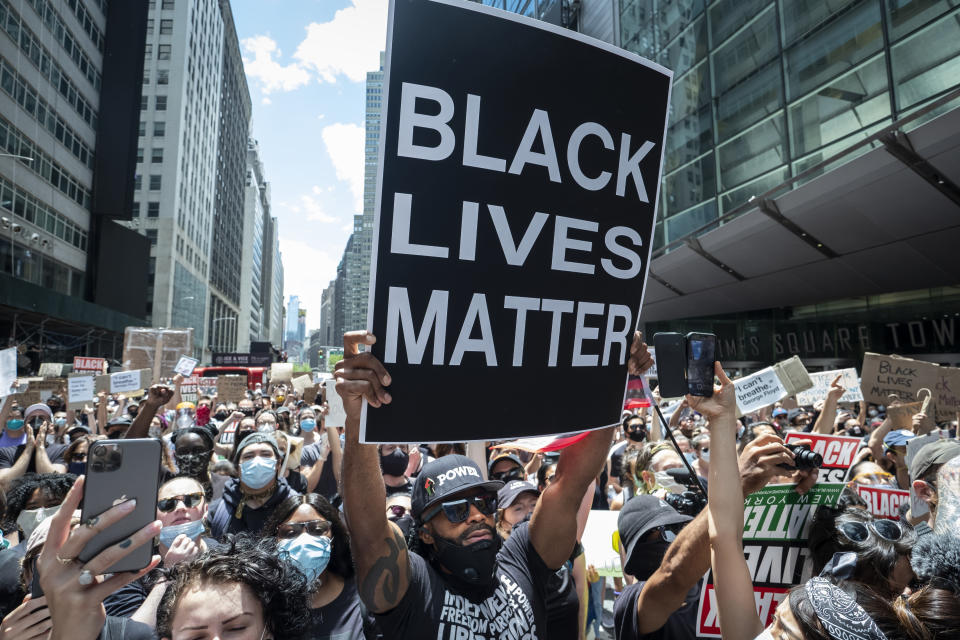One way to reduce the racial wealth gap is with more 401(k)s: Expert
Studies of the racial wealth gap have found that white households have between 6 and 10 times as much saved in the bank as their African-American counterparts.
And that ratio has been largely unchanged (and even grown by some measures) for decades and decades.
One way into tackling the problem, according to Danyelle Solomon, the vice president of Race and Ethnicity Policy at the Center for American Progress, is to look at how our retirement system is set up.
Any solution “has to deal with not only wages but also benefits,” she said in an interview with Yahoo Finance. People of color are over-represented in service-sector jobs and “those are low-wage jobs that don't have quality benefits,” she said.
Re-envisioning ‘the way our economic systems work’
Solomon went deep into the problem in a 2018 report with two colleagues. They detailed the link between access to things like retirement benefits and the racial wealth gap.
The report found that just 37.5% of non-retired Blacks had a retirement savings plan compared with 65.9% of whites.
We have to “re-envision the way our economic systems work,” Solomon said.

A 2018 study by Stanford found that about half of American workers overall have access to a retirement plan like a 401(k) at work. The jobs that offer these plans are positions where people of color are often underrepresented.
A recent survey found that three in four Americans who currently lack access to a workplace retirement plan say they would be likely to participate if given the option.
The consequence of all this is that Black Americans – who already have lower incomes – are falling even farther behind because they aren’t saving and aren’t able to take advantage of the tax-saving features in a workplace retirement plan.
The Urban Institute found that the wealth gap among families in their 30s was about 3-1 but ballooned to almost 7-1 among families aged 65-73. The Institute also found a growing retirement saving gap. In 1989, white families on average had about 5.5 times as much saved away for retirement as Black families. In 2016, the ratio had grown to over 6-1.
[Cashay: Retirement planning: Everything you need to know]
The proposals to fix it
Solomon outlines a range of areas, in addition to benefits at work, that also need to be looked at, like debt and housing (another area where people of color are often left out of key tax benefits).
She also wanted Congress, in the immediate term, to pass things like the HEROES Act, which Democratic lawmakers led by Speaker Nancy Pelosi, passed in May. “Policymakers need to send more money out to people,” Solomon said.
The Center for American Progress is a left-leaning think tank that was founded by John Podesta, a former aide to Bill Clinton.

A range of proposals have been floating around Washington and the country to expand access to retirement. The SECURE Act passed in 2019 and made modest moves to expand access to certain would-be savers. States, like Oregon, Illinois and California, have also implemented plans that expand savings options to everyone with a job.
Oregon’s plan, for example, offers an automatic saving route for people who lack one through their work. The plans offer certain tax benefits but, crucially, are drawn from payroll deductions post-tax, meaning savers are not getting a key advantage that 401(k) participants receive.
Solomon and her colleagues, in their report, call for a plan that would expand the Thrift Savings Plan that’s now accessible to federal government employees and members of Congress. The idea, similar to the plans in Oregon and elsewhere, would open a new avenue of savings for those without access to retirement savings elsewhere.
Solomon notes that coronavirus has exacerbated the existing racial and ethnic disparities and, going forward, “one thing that we've been calling on is that policymakers, including whomever the next president is, take the racial wealth gap seriously,” in the coming decades.
Ben Werschkul is a producer for Yahoo Finance in Washington, DC.
Read more:
Why Black wealth has stayed 'relatively flat' since Tulsa massacre
Report lays out how the gender pay gap becomes a retirement wealth gap
Coronavirus could deplete Social Security as early as 'this decade': analysis
Read the latest financial and business news from Yahoo Finance
Follow Yahoo Finance on Twitter, Facebook, Instagram, Flipboard, LinkedIn, YouTube, and reddit.

 money
money 
